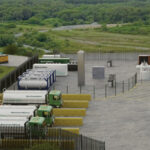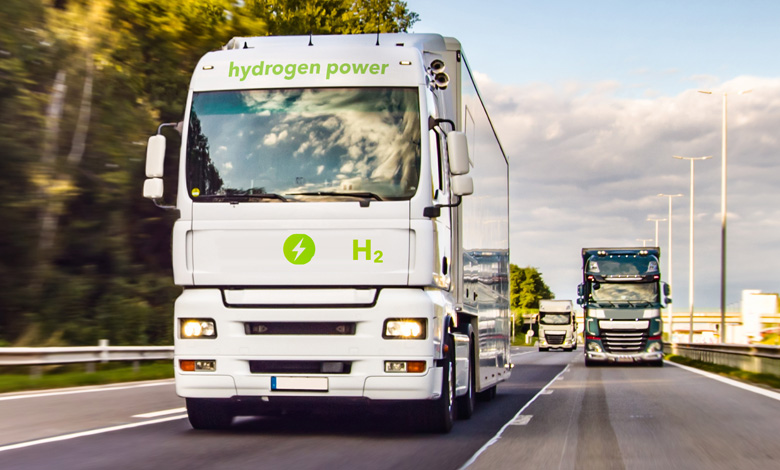
Preparing Ireland’s gas network to transport hydrogen
29th April 2024
The green hydrogen opportunity in Irish decarbonisation
29th April 2024Hydrogen fuel cells: Decarbonising freight transport

A MaREI researcher has hypothesised that in a scenario whereby the State meets its net zero targets, hydrogen fuel cell vehicles will account for approximately 24 per cent of the entire haulage fleet in the State by 2050.
Fionn Rogan, a senior research fellow at University College Cork’s MaREI, was speaking on the findings of a paper he co-authored with fellow MaREI energy specialist Vahid Aryanpur which specifically examines emissions emanating from the freight sector.
Using the Times Ireland Model (TIM) to calculate breakdowns in freight sector projections based on three energy variables – supply, demand, and end use – Rogan states that there is “undoubtedly” a strong role to be played by hydrogen fuel cell-powered haulage vehicles, from both a cost and an emissions reduction perspective.
While the research finds that – due to cost variables – the freight sector will predominately be enabled by battery electric haulage vehicles, the scope for hydrogen fuel cell powered vehicles is up to 25 per cent of the overall haulage fleet, and is necessary if the freight sector, which accounts for 20 per cent of emissions generated in transport, is to play its role in reducing overall transport emissions, which account for 34 per cent of total energy-related emissions.
“In our study, we see a lot of battery electric vehicles. They dominate in all categories; in heavy, medium, and small trucks, we see electrification by 2050,” Rogan says.
“We can see that, in the circumstances in which we move beyond business as usual and fully adopt policies necessary to meet net zero, that by 2050, at least 20 per cent of the vehicle fleet will switch to fuel cell vehicles when we take into account factors such as reduced cargo capacity and increased refuelling time.”
Referring to his study, Rogan points to the key learnings which have been established under the scenario of the Government fully pursuing net zero by 2050 policies.

Fionn Rogan, a senior research fellow at University College Cork’s MaREI,
“Cargo capacity is a key variable in the switching to battery electric vehicles and fuel cell vehicles. Recharging time is another. For instance, when we decrease cargo capacity and increase recharging time, this necessitates an increase in fleet size.”
Examining energy security, Rogan outlines that, with an overall reduction in the import of liquefied natural gas (LNG), as well as volatile oil markets driven by geopolitical events, there are numerous benefits to be realised by the increased use of hydrogen in the freight transport sector.
“Looking at the reduction in diesel import demand and cost in our net zero scenario, there is quite a reduction in imports and in fuel savings. That means less exposure to volatile international oil prices, and there are significant health benefits to be realised from this reduction in emissions.”
Context
The need for solutions to reduce emissions from carbon are self-evident. Between 1990 and 2001, overall CO2 emissions have risen by 115 per cent. Within this total increase, the transport sector has contributed to 34 per cent of energy-related CO2 emissions.
Trucks, by far the largest category for road freight vehicles, make up around only 5 per cent of overall road stock yet are responsible for 20 per cent of overall transport emissions. Moreover, demand in the freight sector is expected to double between now and 2050.
This is a variable in which Rogan expresses statistical confidence, as the MaREI has been working closely with the Economic and Social Research Institute (ESRI), a government think-tank which specialises in economic and social variables, including population and economic growth.
Conclusion
In his concluding remarks, Rogan explains that electric trucks are projected to become the dominant mode of haulage vehicle under all pathways, whether the Government continues with a ‘business as usual’ approach to climate policy, or whether it fully realises the net zero ambitions to which it must pursue.
This is due to future costs of oil and gas, as well as national climate targets. The scope for hydrogen use in fuel cell engines hinges on whether the technology – which is unlikely to be rolled out in any significant way before 2030 – can gather momentum as the State seeks to increase wind energy production which is the key to electrolysis for the production of ‘green’ hydrogen.
|
National Hydrogen Strategy The National Hydrogen Strategy sets out generalised targets for the road haulage sector. The National Road Haulage Strategy 2022-2031 states: “Though the use of hydrogen in road transport is expected to be limited before 2030 due to the slower pace of technological advancements in this area when compared to battery electric vehicles, the [National Hydrogen] Strategy recognises that hydrogen could play an important role in the decarbonisation of road freight transport, especially in certain areas where batteries may not be the most appropriate technological solution.” |
